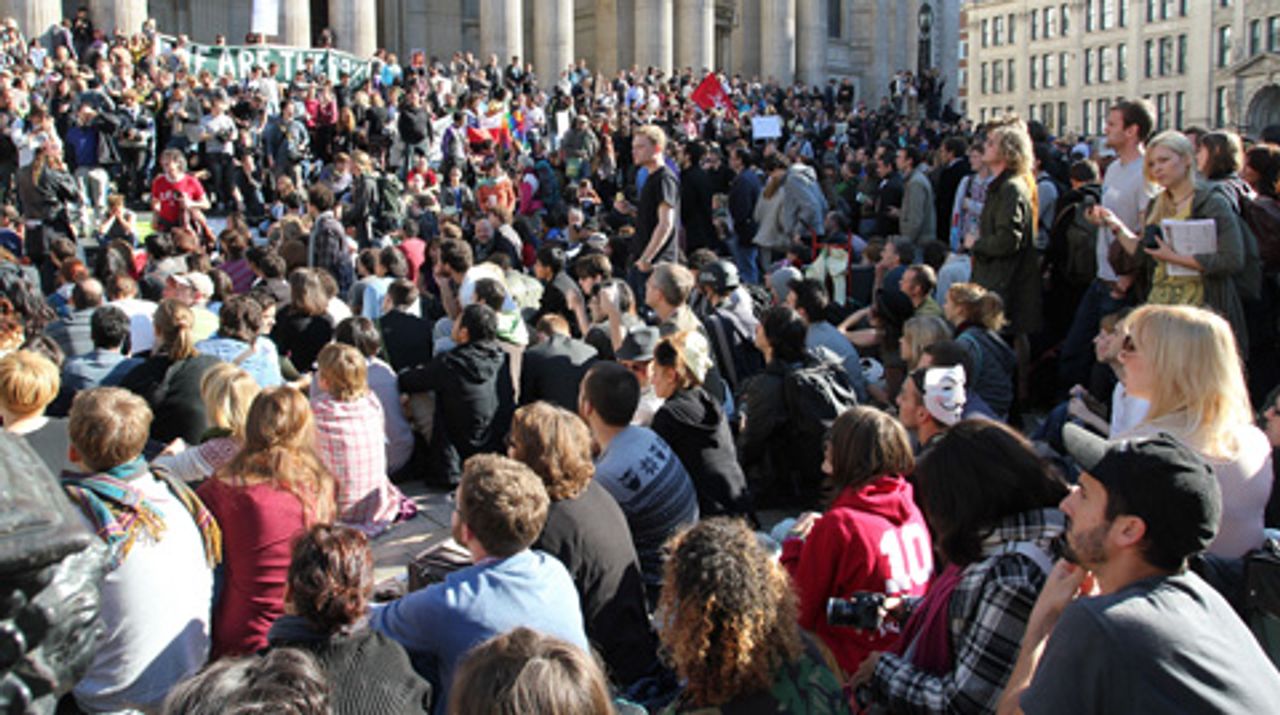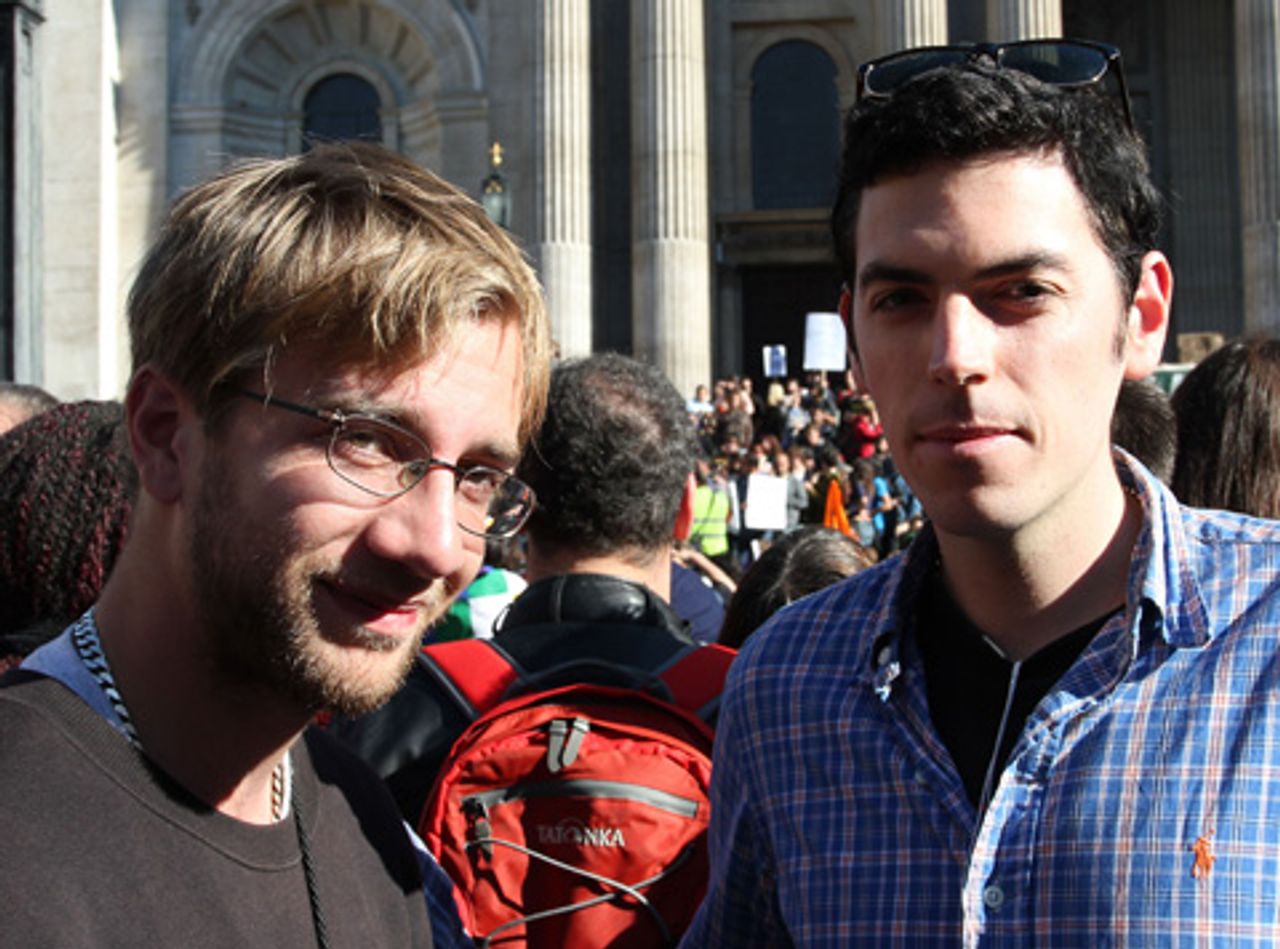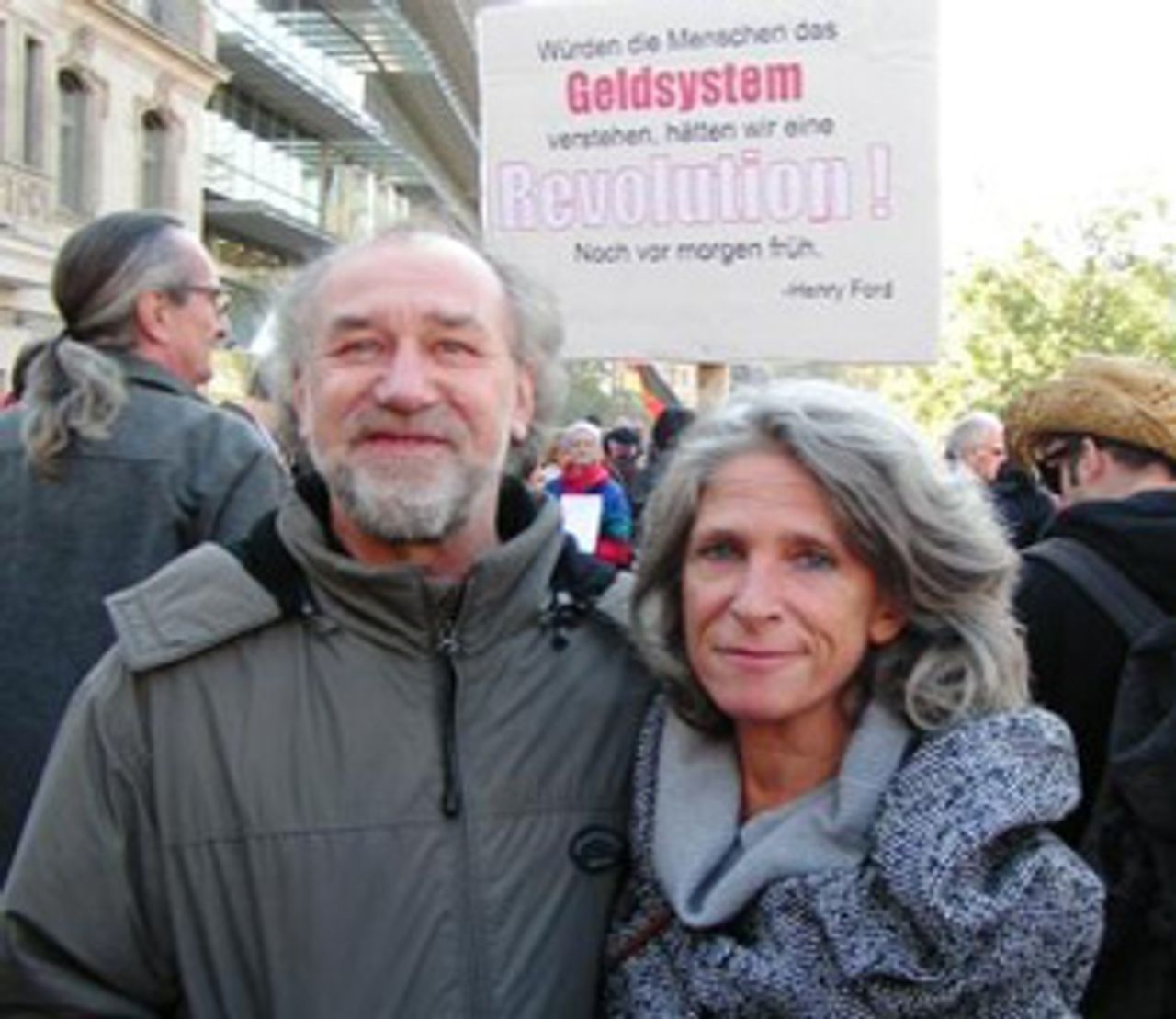 The protest outside St Paul’s Cathedral
The protest outside St Paul’s CathedralIn Britain, several thousand people protested in London’s financial district on Saturday as part of the international Occupy movement. Young people, students, workers and the unemployed gathered outside St. Paul’s Cathedral, near the headquarters of the Bank of England. Many carried homemade banners that included the slogan, “We are the 99 percent.”
The protesters were met by a massive police presence, including hundreds of riot police, some mounted. They were prevented from establishing a tent city outside the London Stock Exchange in the adjacent Paternoster Square by being kettled in and blocked from leaving. Police enforced an order in the City of London allowing them to force people to remove masks covering their faces.
Among the protesters was WikiLeaks founder Julian Assange, who arrived wearing a mask, which the police demanded he remove.
Addressing the crowd, Assange said, “The banking system in London is the recipient of corrupt money… I ask that all of you demand that foreign bank accounts be opened up and made transparent.”
One of the protesters, Anna Jones, said that “a disproportionate amount of force” was used by police. “We have seen people kettled, grabbed and thrown off the steps forcefully by the police,” she said. “This was entirely unnecessary.”
Despite the intimidation, several hundred protesters set up tents and remained outside the cathedral overnight.
Protests were also held in other cities in Britain, including Birmingham, Bristol, Glasgow and Edinburgh. In St. Andrew Square, Edinburgh, around 100 demonstrators turned out and hundreds also protested in Dublin in Ireland.
 Ralph (left) and Robin
Ralph (left) and RobinRalph, from London, said, “I am here because I want to protest against the status quo. I think now it is growing just beyond the national issues and there is more widespread questioning of where the power lies.
“We’re in the midst of this severe recession and there is no going back to business as usual. People’s living standards and expectations have been irrevocably lowered. More and more people are grasping the severity of this crisis and realising that it’s something that no one has witnessed in any of this in their lifetimes. The riots in Tottenham were a reflection of the fact that protest is not facilitated for everyone in this country. The parties do not speak for a section of society.”
Robin said, “We also want to show our solidarity with Occupy Wall Street in America. We have to try to reflect that in this country. We live in Tottenham, so we witnessed the reflection of the recession with the riots right on our doorsteps.
“I’ve applied for about 400 jobs in the last three years and have been unemployed for about a year, and that was after coming out of university with good qualifications and good work experience. I’ve got a job now, but it took a lot of determination and having to do a lot of voluntary work.
“I think there has to be a political fight and this movement needs to be made broader. We need a mass movement that fights for equality internationally.”
Rebecca Gates, a first-year student at Canterbury Christchurch, said of the “no politics” policy of the protest organisers, “It’s just impossible to keep politics out of anything, because it affects everything we do and everything in life. Where does money come from and how is it controlled? It’s done through politics. It’s impossible not to have politics as part of your life. These people need to be more aware of that and to say otherwise it just stupid.
“I am here today to raise awareness. I think everything that happening is so unfair, I just want change. Today is definitely a time for change. I describe myself as a socialist.”
In Germany, several thousand demonstrators gathered in Berlin in front of the offices of the German chancellor before decamping to the adjoining lawn in front of the Reichstag (parliament building).
The demonstration had been organised by the Attac group, which joined the main group of protesters at 5:00 pm with its own march of around 70 people. A speaker then gave the only speech at the rally, heard by about 150 people. The rest of the crowd had assembled in front of the German parliament building.
The speaker declared that the aim of the rally was to “secure a greater share of the cake.” Another Attac supporter then closed down the rally and appealed for food and blankets plus “fresh proposals for the setting up of work groups.”
Later in the evening a group of around 200 protesters attempting to camp out in front of the parliament building were forcibly removed by police using pepper spray. Twelve arrests were made and some demonstrators needed hospital treatment.
Additional protests took place in Frankfurt, Cologne, Munich, Hamburg, Hanover, Stuttgart and a number of cities in the Ruhr area.
In Frankfurt, a gathering of around 5,000 students, unemployed people and workers from all age groups marched through the city’s banking quarter and held a rally in front of the headquarters of the European Central Bank. Many held self-made posters declaring, “You’ve gambled away our future,” “We are all Greeks,” and “Put an end to the privatisation of profits and the socialisation of losses.”
Many posters made clear the anti-capitalist character of the movement. One young woman carried a placard proclaiming: “Regulation of the banks is not enough. We need a complete reorganisation of the money system.” Another read, “Nationalise the banks, Dis-empower the finance industry. Democratise the states. Equality for all.”
As the march approached the European Central Bank, spokesmen for Attac and the Spanish Indignados movement sought to ban political banners. “We are here as a social movement, so we do not want to see any party banners,” one said. Most of the marchers ignored the instruction.
 Robert and Marielou
Robert and MarielouRobert attended the Frankfurt rally with his partner, Marielou. He said, “In my opinion, capitalism has reached the end of the road. Now there is a real chance of being able to turn things around.
“The company I work for gave us an ultimatum and slashed our wages in half. One would not believe unless one has gone through the experience oneself. But at the same time you hear of cases all the time of people doing double the work for the same money due to staff reductions.”
Hein Klein from Offenbach said, “The bankers and the politicians in their pockets can go to hell. It is unacceptable that the banks dictate everything.”
Fill out the form to be contacted by someone from the WSWS in your area about getting involved.
